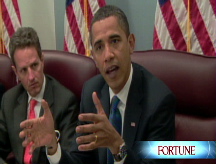Jobs plan: It'll help, but only so much
If Obama's rescue program works, the economy will improve by the end of 2010. But don't expect jobs around every corner.
NEW YORK (CNNMoney.com) -- President-elect Barack Obama is trying to rally Congress - and the public - around a two-year plan to create 3.7 million jobs and revive the economy.
No doubt about it, it will cost a lot. And economists from left and right are convinced it's what the country needs. But how much better off will we be by 2011?
The likely answer, unfortunately, doesn't involve a ticker-tape parade and a booming job market.
Obama's desire to create or save at least 3 million jobs is "a very concrete way of saying we want to ease as much of the pain as we can," said economist Christina Romer, a coauthor of the analysis and Obama's choice to head the Council of Economic Advisers, in a video address released this weekend.
That, in a nutshell, conveys what the Obama plan can realistically accomplish if it succeeds: ease, but not erase, the economic stress hitting the country.
While 3.7 million jobs is nothing to sneeze at, the truth is that it won't spell happy days again. The unemployment rate is expected to be 7% at the end of 2010, according to the report - lower than it would be without stimulus but still about where it is today.
"If everything goes as planned, which is unlikely, then the plan would get jobs back to where they were when the recession began" in December 2007, said Lakshman Achuthan, managing director of Economic Cycle Research Institute.
In healthy economic conditions, the economy would create an average of 100,000 to 150,000 jobs a month to keep pace with the growth in the nation's labor force.
But instead of creating 1.8 million jobs in 2008, the economy lost 2.6 million. So if the economy were to completely make up for lost ground by the end of 2010, the country would need to create something closer to 8 million jobs in the next two years, or roughly twice what Obama's team estimates his nearly $800 billion package could generate.
"In their best-case scenario, it's not a great story," said Nariman Behravesh, chief economist at IHS Global Insight, who believes an economic recovery package is needed to stem the downturn. "This is going to be a jobless recovery. It's going to be a long while before we make up lost ground."
Behravesh's best guess: The economy will have caught up to where it should be by early 2012.
That's not to say things won't start to look up well before then, he said, noting that there could be months in which as many as 400,000 jobs will be created.
"There'll be a clear sense that the economy is growing again, but employers will wonder if it's real," Behravesh said.
He did allow for a more positive scenario - the chance that just as the economy went into a rapid and steep decline last fall, it could enjoy a speedier recovery than many expect.
The stimulus, combined with the huge drop in commodities prices, record low interest rates, and the fact that the various financial rescue packages put in place have begun to work "could all converge to give us a pretty good pop, but not before 2010," Behravesh said.
Whatever the rate of recovery, Romer is focused not only on the economy creating the greatest number of jobs but also the most viable ones for workers. She noted in her video address that since the recession started a year ago, 3.4 million workers have moved from full-time to part-time jobs out of economic necessity.
"As we improve the overall health of the economy ... one of the things we expect and hope to see is those people forced into part-time will get to move back to full-time," Romer said.
But, of course, the measures that will deliver that kind of success will be the subject of much debate as lawmakers begin drafting legislation to help the economy dig itself out of a very deep hole.
On Jan. 20, Barack Obama will be inaugurated as the 44th president of the United States. What should he do to help common Americans in these trying economic times? E-mail us at realstories@cnnmoney.com, and your thoughts could be part of an upcoming story. ![]()




